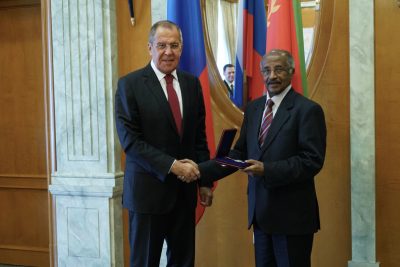Russia’s Pivoting to the Horn of Africa and the Red Sea via Eritrea and the UAE

Note to readers: please click the share buttons above. Forward this article to your email lists. Crosspost on your blog site, internet forums. etc.
Featured image: Russian Foreign Minister Sergey Lavrov met Eritrea’s Foreign Minister Osman Saleh, August 31, 2018, Sochi, Russia
Russian Foreign Minister Sergei Lavrov lauded his country’s relationship with Eritrea and informed the world about Moscow’s plans to build a logistics center there.
He was speaking alongside his Eritrean counterpart at a press conference in Sochi after their bilateral meeting, which he also noted included discussions about building regional transport corridors, pipelines, and opening up a Russian language department in one of Asmara’s universities. Lavrov also said that the UNSC sanctions against Eritrea that were imposed in 2009 after reports that the country was aiding Somalia’s Al-Shaabab should be lifted, and he praised Eritrea for all that it’s done in the name of regional peace over the past few months in view of its rapidly moving rapprochement with Ethiopia that completely transformed the geopolitical situation in the Horn of Africa.
In terms of the bigger picture, it appears as though Russia is keen to use Eritrea as a gateway to regional giant Ethiopia, which is the second-most-populous country in Africa and its fastest-growing economy. The Eritrean-Ethiopian rapprochement will see Addis Ababa diversify its access to the rest of the world from its erstwhile mono-dependence on Djibouti, which will expectedly see Eritrea’s connectivity role growing in importance as well. Moreover, Russia’s intended investments in Eritrea signal that it’s serious about its so-called “Pivot to Africa” and eager to establish a strategic presence in the Red Sea-Horn of Africa region after being reportedly offered a naval base in neighboring Sudan and amidst unconfirmed reports that it was earlier considering one in the breakaway region of Somaliland.
Another point to bear in mind is that the UAE is Eritrea’s top international partner and is responsible for not only breaking the country’s international isolation after building a base there for assisting in the War on Yemen, but is also considered to be one of the key facilitators of the Eritrean-Ethiopian rapprochement. Abu Dhabi is therefore a rising transregional power that’s also simultaneously cultivating much stronger ties with Moscow than ever before, with both parties signing an official Declaration of Strategic Partnership in early June after Crown Prince Mohammed Bin Zayed travelled to the Russian capital to meet with President Putin. Accordingly, Russian-Emirati ties will converge in Eritrea, and possibly soon thereafter, even in Ethiopia as well.
Unbeknownst to many, the Russian-Emirati Strategic Partnership is already surprisingly robust as it is even without any overlapping interests in the Horn of Africa. The two sides inked a nearly $2 billion defense deal in February 2017 and have vowed to cooperate in the cybersecurity and energy spheres. In addition, the oil-rich collection of emirates wants to purchase Russia’s electric cars and motorcycles, as well as the Aurus brand of luxury sedans that President Putin recently popularized. In fact, the sky’s not even the limit to Russian-Emirati cooperation, literally, because Moscow is preparing to send one of its partner’s cosmonauts to the International Space Station in the near future.
Altogether, the grand strategic importance of Russian-Eritrean relations rests in their potential to not only facilitate Moscow’s “Pivot to Africa” in the Horn of Africa and especially in Ethiopia, but also in their ability to strengthen the already solid and fast-moving partnership between Russia and the UAE via the third-party country in which they evidently have many shared interests. Furthermore, successfully proving the concept that Russian-Emirati cooperation can bring tangibly positive dividends in other countries such as Eritrea might also open up the door for Abu Dhabi to invite Moscow into South Yemen where it previously exerted influence during the Soviet era, thereby possibly allowing it to contribute to the reconstruction of that war-torn society and solidify its strategic presence in the Red Sea-Gulf of Aden region.
*
This article was originally published on Oriental Review.
Andrew Korybko is an American Moscow-based political analyst specializing in the relationship between the US strategy in Afro-Eurasia, China’s One Belt One Road global vision of New Silk Road connectivity, and Hybrid Warfare. He is a frequent contributor to Global Research.

